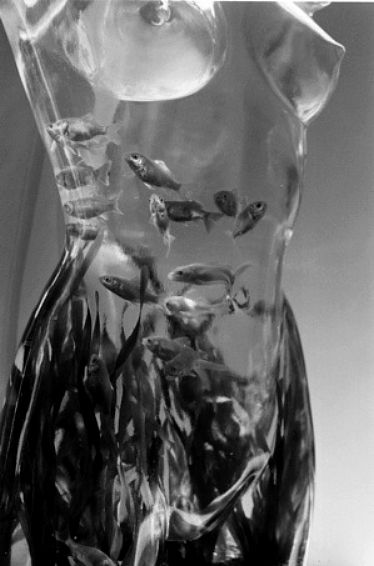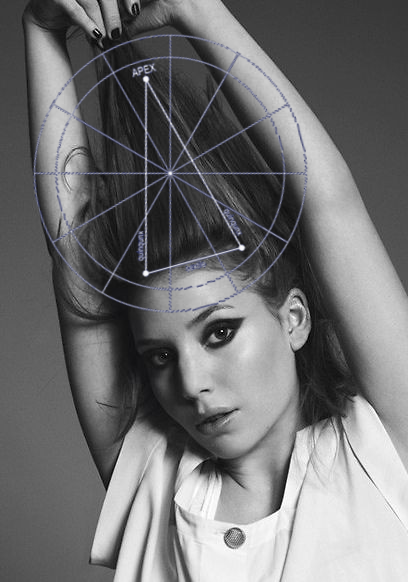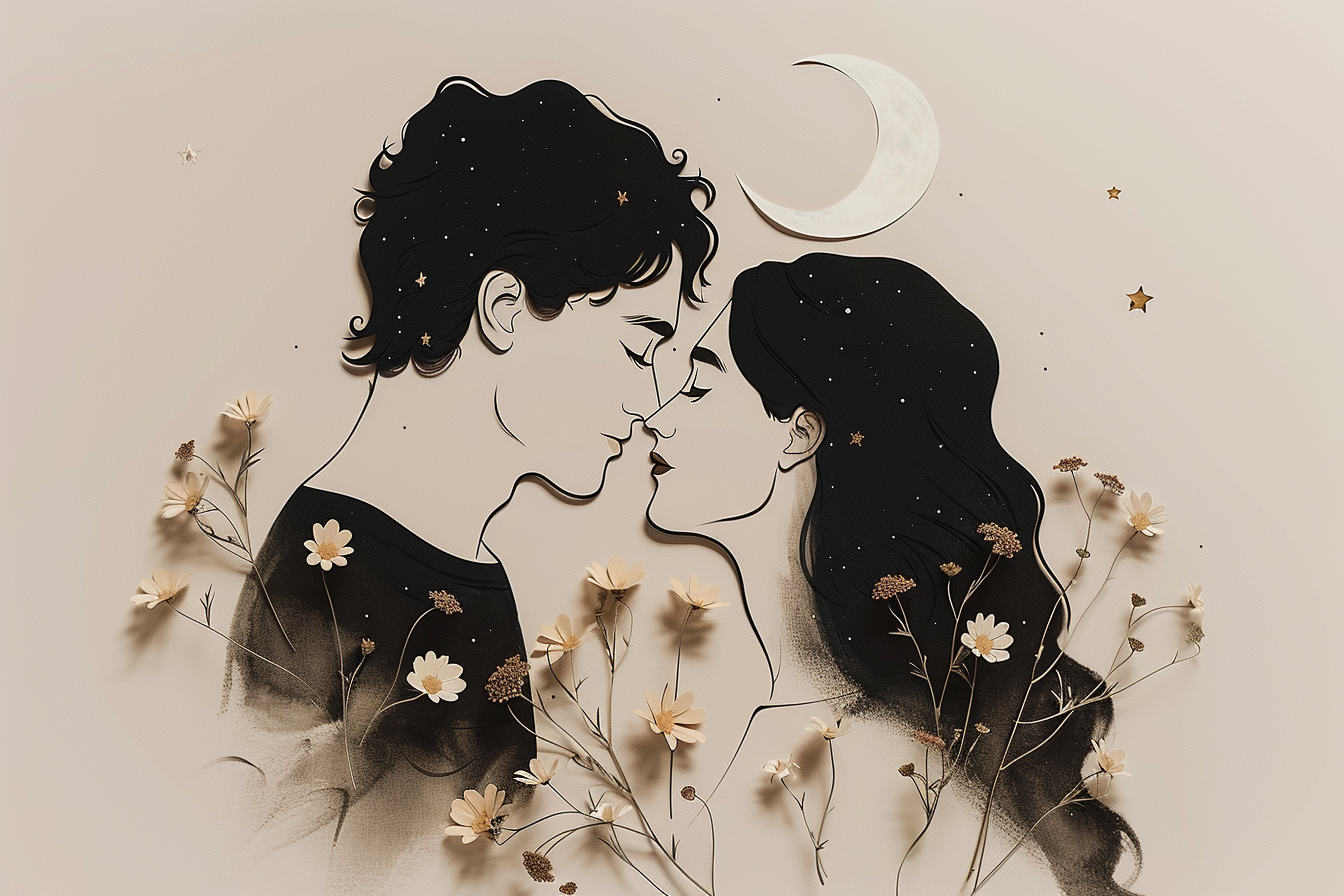
Twelfth House Dreams
 In the twelfth house we venture into a realm of deep, watery intuition, akin to a fish swimming through the currents of the unconscious. This watery world is where things get confusing, where the conscious mind retreats into the fog and the subconscious rises as a tidal wave, pushing fragments of the forgotten, the repressed, and the hidden into the light—if only for a moment, before they slip away again. Pisces, Neptune, and the Twelfth House, they are the rulers of this realm. They hold the door open, just slightly, so you can peer into the depths and wonder at what might be lurking in the shadows. Neptune, the misty, nebulous planet, is the guide to our imagination, fantasy, and illusion. It shows us the world as we feel it, not as it is. And this is important when it comes to dreams, because dreams are not about linear stories. Dreams are more of a gallery of symbols, an art show that your unconscious mind is putting on, each piece subtly referencing some deeper aspect of who you are, what you fear, or what you long for. Neptune blurs boundaries, leaving you unsure of where the dream ends and you begin.
In the twelfth house we venture into a realm of deep, watery intuition, akin to a fish swimming through the currents of the unconscious. This watery world is where things get confusing, where the conscious mind retreats into the fog and the subconscious rises as a tidal wave, pushing fragments of the forgotten, the repressed, and the hidden into the light—if only for a moment, before they slip away again. Pisces, Neptune, and the Twelfth House, they are the rulers of this realm. They hold the door open, just slightly, so you can peer into the depths and wonder at what might be lurking in the shadows. Neptune, the misty, nebulous planet, is the guide to our imagination, fantasy, and illusion. It shows us the world as we feel it, not as it is. And this is important when it comes to dreams, because dreams are not about linear stories. Dreams are more of a gallery of symbols, an art show that your unconscious mind is putting on, each piece subtly referencing some deeper aspect of who you are, what you fear, or what you long for. Neptune blurs boundaries, leaving you unsure of where the dream ends and you begin.
Pisces, the last sign of the zodiac, represents this final surrender to the mysteries of the universe. It is the wellspring from which all other signs spring, yet it’s also the place to which everything returns. In the dream world, this is where the transformation happens—the part of us that longs to return to the ocean, to merge with everything and nothing, dissolving ego and seeking the purity of connection. Think of it like a brief, blissful union with the universe, where your waking self is merely a ripple in a vast, ineffable sea.
The Twelfth House is the house of secrets, the unconscious, the mysterious realm. This house is where Pisces feels most at home, a space where hidden patterns are uncovered, where things we cannot see in the bright daylight of our waking consciousness often present themselves, perhaps distorted, but always true in their own elusive way. When planets are placed here, they are like shadows cast against the wall, and the only way to truly understand them is to delve into the night, to enter the unconscious process, to seek answers in the hidden realms of sleep, fantasy, and reflection.
Dreams are the language of this mystical trio. They are the gateway where Neptune’s fog swirls, where Pisces swims in its boundless empathy, and where the Twelfth House brings things to the surface just long enough for us to catch a glimpse of them. It’s a strange, marvelous place, and when you allow yourself to dive into it, you may find that the answers you seek don’t always come in the form of reason. Instead they arrive as images, symbols, feelings—fragmentary pieces of a much larger puzzle that only your soul can comprehend. And in that, you may find a deeper understanding of who you are, in all your untapped potential and submerged beauty.
Dreams are not night-time theatre performances but transmissions from the soul’s deep vaults. They are the unconscious speaking, scrawling messages onto the foggy glass of our waking awareness.
A Deeper Way of Seeing
The Twelfth House is a place where the self is not so much defined as it is dissolved, where the ego disappears into the unconscious mind. It is a house of surrender, of secrets, of things lurking just beyond the reach of our rational minds. And yet, it is in this very ambiguity, this very fog, that we find the richest material for self-discovery.
Neptune, the slippery deity of illusion and transcendence, is the great conjurer of dreams. It drapes the world in mystery, not to confuse us, but to invite us into a deeper way of seeing. It’s the planet that speaks through intuition, sending messages through dreams, luring us into the depths of our own psyche, not with logic, but with feeling. It is the siren’s song that calls us to explore the vast ocean of our unconscious mind, even if we fear the waves.
And what are dreams, if not the stories our soul tells when the conscious mind finally falls silent? They are the strange, symbolic, nonsensical-yet-profound riddles of our inner world. The Twelfth House, ruled by Neptune, is the realm where unspoken fears slip through the cracks, where past-life and karmic imprints float like ghostly apparitions, where the self dissolves into something vaster, something infinite.
Yet, none of this can be accessed without sleep, that necessary pause of existence. Sleep is the portal. It is the bridge between the seen and the unseen, the conscious and the unconscious, the waking self and the dreamer within. It is a great reset, a nightly retreat into the unknown, where the mind stitches together the fabric of our experiences. Without it, we unravel. The conscious mind, deprived of its nightly descent into the depths, becomes brittle, erratic, lost. Our emotional stability wavers, our perception distorts, and the barriers between reality and illusion blur—not in the mystical, Neptune-inspired way, but in a chaotic, fragmented way.
Dreams, when neglected, don’t disappear; they simply find new, more disruptive ways to make themselves heard—through anxiety, through burnout, through an inexplicable sense of disconnection from the self.
Pisces, the gentle dreamer, is the perfect sign of this realm. It drifts through life as if existing in two worlds at once—one foot in the waking reality, the other dipped into the great unconscious sea. To be a Pisces, or to have strong Twelfth House placements, is to live with a kind of perpetual déjà vu, a feeling that there is something just beyond the veil, something vast, something speaking to you in symbols rather than words. And what are dreams, if not the unconscious mind speaking in its own cryptic language?
Neptune, ruler of this watery domain, is the great dissolver. It erodes the boundaries of reality, softening the edges, allowing imagination and intuition to flourish. But in its highest expression, Neptune is the planet of transcendence. It invites us to go beyond the surface of things. This is why dreams, as ruled by Neptune and the Twelfth House, are so significant. They are the mind’s way of revealing truths that are too abstract, too vast, to be processed through the conscious self.
And yet, the Twelfth House is not just a place of dreams—it is also the house of surrender. Of letting go. Of allowing the tide to take you where it will, without resistance. It teaches that some things are not meant to be controlled or understood in the typical sense, but rather felt, experienced, and absorbed. To resist the influence of this house is to struggle against an ocean current; the more you fight, the more exhausted you become. But if you float—if you trust—there is a peace to be found.
Dreams: A Chaotic Jumble
The age-old debate is whether dreams are the brain’s way of taking out the neural trash or if they are messages from the universe, encoded in mysterious symbols and surreal landscapes. The rationalists scoff, calling dreams a chaotic jumble of fragmented thoughts, no more meaningful than static on an old television set. Meanwhile, the mystics sit cross-legged, gazing into the depths of their own subconscious, convinced that dreams hold the keys to past lives, divinity, and the secrets of the cosmos. But perhaps, as with most things, the truth lies somewhere in between.
Modern neuroscience tells us that dreams are linked to memory consolidation, problem-solving, and emotional processing. They occur as the brain organizes and integrates the vast influx of information we absorb daily. From this perspective, dreams are not mystical prophecies—they’re a kind of mental housekeeping, a nightly sorting process where significant events are cataloged. But does that make them meaningless? Hardly.
Even if dreams are the mind’s way of processing reality, they still reflect something essential—our emotions, our fears, our desires, and the unresolved issues running beneath the surface of our waking lives. If we choose to dismiss them entirely, we risk ignoring valuable insights about ourselves. After all, isn’t it fascinating that the same mind that grounds us in reality can also conjure chaotic, surreal, and deeply symbolic dreamscapes? Surely that says something about the human experience—that we are not only thinking beings but dreaming beings, forever straddling the worlds of reason and mystery.
The Egyptians, the Greeks, the shamans of indigenous cultures—they didn’t revere dreams because they were superstitious fools. They understood, in a way that modern science is only beginning to acknowledge, that dreams often reveal what is hidden—whether it’s an intuitive premonition, a psychological breakthrough, or an artistic inspiration waiting to be birthed. Dream incubation, for example, where seekers would sleep in temples to receive divine guidance, was a practice of deep listening, of surrendering to the unconscious and trusting that answers could arise from it. Today, we might not call it divine prophecy, but we do recognize the power of dreams in therapy, creativity, and even scientific discovery. Einstein’s theory of relativity was inspired by a dream. So was the benzene molecule. Even Paul McCartney’s song Yesterday came to him in a dream.
Past Lives
Dreams are thought to be portals to past lives, other dimensions, or even the truer, more real reality. What if, when we sleep, we are not only resting, but traveling? What if our dreams are not really reflections of this life, but one of many lives, scattered like stars across time and space? It’s the idea that we are not these single-use human avatars, here for one brief flicker and then gone, but eternal souls floating in and out of existence, learning, growing, and evolving. And if we do carry the imprints of past lives within us, where would they surface? Certainly not in the harsh glare of daily consciousness. Former existences would bubble up in the liminal space of dreams, where the conscious mind is quiet and the deeper self can be heard.
Think about those strangely vivid dreams that don’t feel like dreams at all—the ones where you wake up with the lingering sensation of having been somewhere, of having lived something that feels realer than real. A different era, a different body, a different story—yet somehow, you are still you. These experiences, some would say, are glimpses into past lives, brief cracks in the veil that separate our many incarnations.
Then there’s the fascinating idea, proposed by some spiritual thinkers and channelers, that the dream world isn’t a passive realm but an active one—where we, or our Higher Selves, are constantly working things out. In this view, we aren’t reliving old memories in dreams; we are rehearsing new timelines, playing out choices, forming potential realities before they manifest in waking life. What if our deepest lessons are first processed in the dream world before they crystallize here? What if, in our sleep, we are healing, resolving karmic knots, and choosing our next steps?
And here’s the mind-bending kicker—what if this waking life is actually the dream, and the dream world is the true reality? There are spiritual traditions that suggest exactly this—that when we sleep, we return to our real home, our Higher Self’s domain, and that this waking existence is the illusion, a temporary projection we take far too seriously. Perhaps every night, when we lay our heads down, we are not simply resting—we are returning.
Of course, skeptics will dismiss all this as fantasy, and that’s fine. But isn’t it interesting that so many people, across cultures and time periods, have had strikingly similar dream experiences—visions of past lives, encounters with guides, glimpses into strange but oddly familiar landscapes? Even if none of it is literally true, it is still psychologically true, still meaningful, still revealing something about who we are beneath the surface. So maybe, just maybe, when you next drift off and find yourself wandering through an ancient city you’ve never seen, speaking a language your waking self doesn’t know, or meeting a wise stranger—don’t dismiss it too quickly. It might only be a dream. Or it might be you remembering.
Jungian Psychology
Jung was a man who gazed into the unconscious with the curiosity of a mystic. He respected dreams, saw them as messages from the depths of the psyche, rather than the meaningless rubbish that some of his peers dismissed them as. Jung understood what the ancients knew—that within the mind, in its shadows and symbols, lie the keys to self-discovery. His concept of the Higher Self viewed dreams as a bridge to something greater, something beyond the small, conditioned ego-self we so often mistake for our true identity. The Higher Self is not a loftier version of us; it is the whole of us—the integrated, balanced being we are striving to become. But before we can fully embody it, we must first confront what stands in the way.
And that’s where the shadow comes in. The shadow—our disowned self, the cellar of the psyche where we shove everything we’d rather not acknowledge. Our fears, our shame, our repressed desires, our unresolved wounds—all the bits of ourselves we exile because they don’t fit the neat, curated image we present to the world. Yet, as Jung so wisely pointed out, ignoring the shadow doesn’t make it disappear. It lurks, it festers, it seeps into our lives in unconscious ways—through self-sabotage, projection, irrational fears, and patterns we can’t seem to break.
Dreams, then, are one of the ways the shadow speaks. They show us what we refuse to see in waking life. The recurring nightmare? The strange, unsettling figure that keeps appearing? The distorted reflection of yourself? These can seem like random fragments of the mind—but it’s the unconscious. The shadow knocking at the door, asking to be acknowledged, integrated, and, ultimately, healed.
Jung saw the process of individuation—the journey towards wholeness—as the merging of these fragmented parts, the conscious and unconscious, the light and the dark. To become who we truly are, we must stop running from ourselves. We must turn toward the shadow, sit with it, listen to it, and understand that it is not our enemy—it is our teacher. And here’s where it gets really interesting: when we integrate the shadow—we expand. We become fuller, richer, more authentic versions of ourselves. Our creativity deepens, our relationships transform, our intuition sharpens. We are no longer at war with ourselves, no longer ruled by the unconscious forces pulling our strings from behind the curtain.
The next time a dream unsettles you, don’t dismiss it. Sit with it. Ask it what it is trying to show you. Is it revealing a fear you’ve buried? A truth you’ve ignored? A wound you need to heal? Because in its hidden message, in the cryptic dream language, might be the next step on your path to becoming the person you were always meant to be. Jung knew it, the mystics knew it, and somewhere deep inside, you know it too.
The Last Room
If the birth chart is a house, then the Twelfth House is the locked room at the end of the hallway, filled with all the things we’ve tried to forget. It’s a space of karmic residues, and deep spiritual reckonings—a place where the ego begins to dissolve, making way for something vaster, something beyond the self. It’s filled with things we’d rather not deal with. The broken bits of identity we’ve abandoned. The unresolved emotions we shoved into the corners of our psyche. The dreams we dismissed as nonsense, but that, in reality, were knocking at the door of our unconscious, trying to be heard.
The Twelfth House asks us to clear out the emotional and spiritual debris so we can move forward unburdened. This is where dreams become necessary. If the Twelfth House is the unconscious storehouse, then dreams are the key to unlocking it. They are postcards sent from the depths of our own psyche, revealing what we have ignored, what we need to confront, and sometimes, glimpses of the beyond. The ancient Greeks were onto something when they believed that dreams were the soul’s adventures in the astral realm. After all, doesn’t it feel like that sometimes? Those dreams so vivid, so charged with meaning, that they leave an imprint on your waking self, as if you went somewhere, as if you lived something real?
So perhaps the question is: What messages is your Twelfth House sending you in your dreams? What symbols keep recurring, what emotions surface in the dead of night? Are they asking you to acknowledge something? To heal something? To let something go?
Nighttime Entertainment
Dreams are not nighttime entertainment; they are messengers, guides, and sometimes, tricksters, revealing truths that our waking minds are too distracted, or too afraid to see. The emotional charge of a dream is its heartbeat. It is the why behind the imagery, the magnetic pull that demands our attention. If a dream leaves you breathless, unsettled, or profoundly moved, it is speaking to something deep within you—perhaps an unhealed wound, an unspoken desire, or a truth that has been knocking at the door of your awareness, waiting to be let in.
These charged moments are the key to dream analysis; they are not random. They are the psyche’s way of saying, Look here. This matters.
And then we have the symbols—the language of the unconscious, a language older than words. Some symbols are deeply personal, stitched into the fabric of our own memories. A childhood home appearing in a dream may mean one thing to you and something entirely different to someone else. Other symbols are archetypal, drawn from the collective well of human experience—the serpent, the ocean, the mirror, the maze. These are are universal motifs, resonating with the deeper layers of the psyche, mirroring the very nature of our inner worlds.
Carl Jung understood this well. He saw dream symbols as a bridge between the conscious and unconscious mind, a way for the psyche to communicate in a form that bypasses rationality and speaks directly to the soul. When we pay attention to these symbols, we begin to uncover what’s hidden. The bridge between the known and the unknown strengthens. The conversation between the conscious self and the unconscious deepens.
Dreams offer us a map of ourselves, not in straightforward sentences, but in rich, symbolic storylines. They invite us to listen, to feel, to decode. We are more than our waking selves, there is something more beneath the surface of daily life, an ocean of meaning waiting to be explored. The next time a dream lingers, pulling at your emotions, sit with it. Ask it what it is trying to tell you. Look at the symbols, the patterns, the emotional weight. Because within that dream, hidden among the surreal landscapes and shifting faces, may be a piece of yourself waiting to be reclaimed.



















 Venus Trine Pluto: Dark Desires
Venus Trine Pluto: Dark Desires
 Mars Conjunct Pluto Synastry
Mars Conjunct Pluto Synastry
 Moon Conjunct Mars Natal Aspect
Moon Conjunct Mars Natal Aspect
 Venus-Pluto Synastry: A Love So Powerful That It Might Just Kill Them
Venus-Pluto Synastry: A Love So Powerful That It Might Just Kill Them
 Sun Square Pluto Synastry: You’ve Got That Power Over Me
Sun Square Pluto Synastry: You’ve Got That Power Over Me
 Saturn in the 1st House: From Self-Doubt to Lasting Identity
Saturn in the 1st House: From Self-Doubt to Lasting Identity
 Venus Trine Mars Synastry
Venus Trine Mars Synastry
 Reflections on a Past Venus-Pluto Synastry Aspect
Reflections on a Past Venus-Pluto Synastry Aspect
 The Scorpio Teenager
The Scorpio Teenager
 Mars-Pluto Synastry: Something Quite Dark and Dangerous
Mars-Pluto Synastry: Something Quite Dark and Dangerous
 Mars in Aquarius: Sex drive
Mars in Aquarius: Sex drive
 The Yod Aspect Pattern: The Mystical Power of the “Finger of Fate”
The Yod Aspect Pattern: The Mystical Power of the “Finger of Fate”
 Sun Square Pluto Natal Aspect: I Am Titanium
Sun Square Pluto Natal Aspect: I Am Titanium
 Moon Conjunct Pluto Synastry
Moon Conjunct Pluto Synastry
 Emotional Understanding: Moon Trine Synastry Aspects Interpreted
Emotional Understanding: Moon Trine Synastry Aspects Interpreted
 Uranus Transits: 1st House: Winds of Change:
Uranus Transits: 1st House: Winds of Change:
 The Moon: The Goddess of the Night
The Moon: The Goddess of the Night
 Venus Conjunct Neptune Synastry: Euphoria and the Aftermath
Venus Conjunct Neptune Synastry: Euphoria and the Aftermath
 Saturn Transits Mars: When the God of Time Meets the God of War
Saturn Transits Mars: When the God of Time Meets the God of War
 Pluto in Libra in the 2nd House: Lessons on Self-Worth and Financial Independence
Pluto in Libra in the 2nd House: Lessons on Self-Worth and Financial Independence